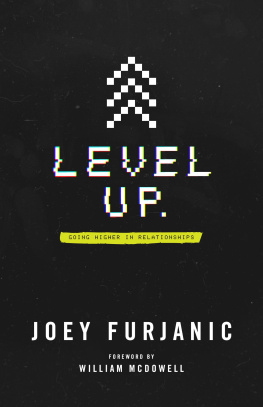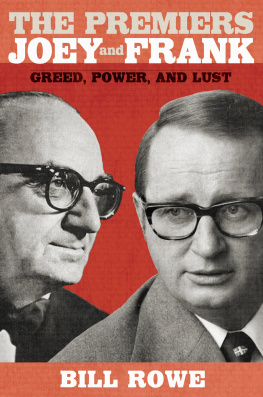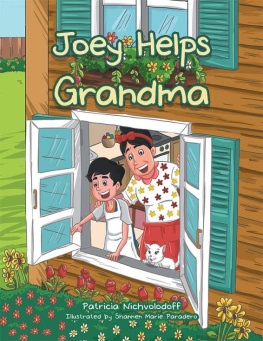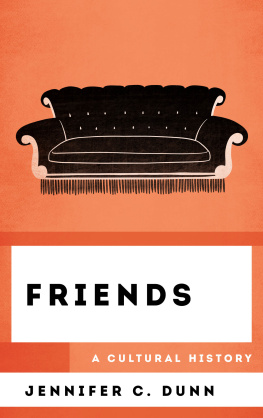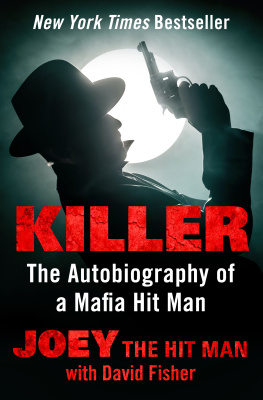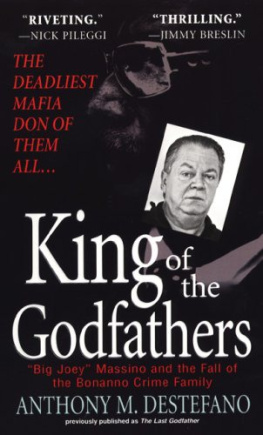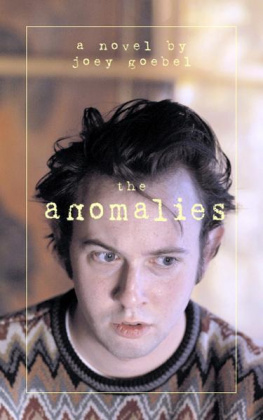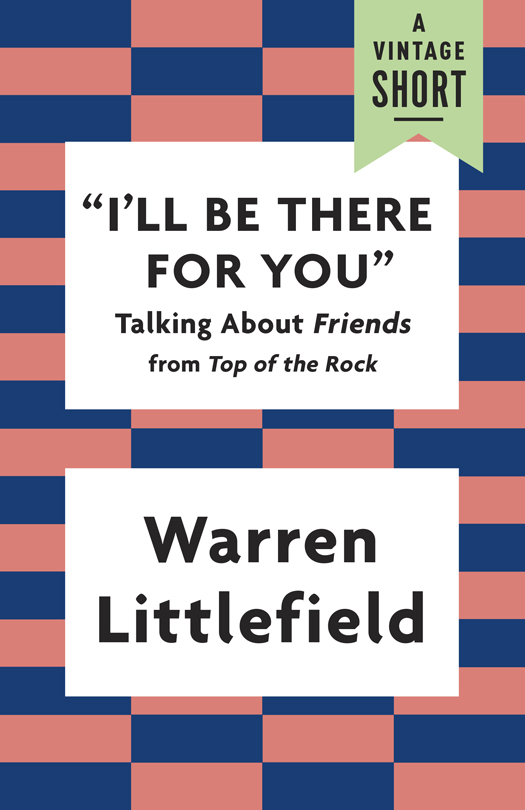Warren Littlefield
Warren Littlefield is the former NBC President of Entertainment. He developed such hit shows as The Cosby Show, Golden Girls, and The Fresh Prince of Bel-Air. He currently is the executive producer of the critically acclaimed Fargo on FX, winner of two Critics Choice Awards and three Emmy Awards. Additionally he runs his own television production company.
T. R. Pearson is the author of fourteen novels, including A Short History of a Small Place, and a dozen screenplays.
Ill Be There for You
Talking AboutFriends
from Top of the Rock
Warren Littlefield
Former NBC President of Entertainment
with T. R. Pearson
A Vintage Short
Vintage Books
A Division of Random House LLC
New York
Copyright 2012 by Warren Littlefield
All rights reserved. Published in the United States by Vintage Books, a division of Random House LLC, New York, and in Canada by Random House of Canada Limited, Toronto, Penguin Random House companies. Originally published as part of Top of the Rock in the United States by Anchor Books, a division of Random House LLC, New York. Originally published in hardcover in the United States by Doubleday, a division of Random House LLC, New York, in 2012.
Vintage and colophon are registered trademarks of Random House LLC.
The Cataloging-in-Publication Data for Top of the Rock is available from the Library of Congress.
Cover design by Joan Wong
Vintage eShort ISBN: 978-1-1019-1035-1
Photographs courtesy NBC Universal Photo Bank
www.vintagebooks.com
v3.1_r1
Contents
Jamie Tarses (former NBC vice president of comedy development): I remember sweating the ratings of Friends the first few weeks. It was falling off more than anybody wanted it to. Outside of development, there was a lot of doubt about Friends.
Warren Littlefield:Mad About You had successfully slugged it out with The Simpsons, and Fox had moved that show to Sunday at 8:00. Now we were leading off Thursday night in first place, so a big falloff with Friends was not going to be acceptable.
Preston Beckman (former NBC scheduler and strategic planner): The Friends pilot didnt test great.
Warren Littlefield: Truea high weakbut we loved it! Even though we still only had Jennifer Aniston in second positionCBS had yet to cancel Muddling ThroughI decided to take another multimillion-dollar bet and shoot episodes with Jennifer in them.
Karey Burke (former NBC executive vice president of prime-time series): Six of One was the name of the show during the pilot. Then Kauffman and Crane came back with Friends, which we thought was such a snore. Some people thought the show was too Gen X, way too narrow. There was much more buzz about Foxs version of the same concept, a show called Wild Oats with Paul Rudd.
Matt LeBlanc: I remember seeing the test audience results for the pilot. It didnt test well, I dont think.
Karey Burke: Between Friends and NewsRadio, I couldnt have told you which one would be a hit. The Friends cast came to the pilot taping of NewsRadio. Jimmy Burrows was directing it, and the Friends cast was jealous.
Jamie Tarses: The first couple of scripts after the pilot, we were struggling with scripts and struggling with story. Then it was a soap opera, and it was hilarious. The Ross and Rachel thing set the tone for that, and you got thrust into a sort of soapy storytelling.
Warren Littlefield: For me, we were about six scripts in, and each time Id read one, I saw tremendous emotional resonance. I thought, This is a Shakespearean soap opera. Its a drama thats really, really funny, and with a complex architecture. Unlike Seinfeld, which lived to be funny but not to feel.
David Crane (co-creator and executive producer): Thats why we were always surprised when people compared us to Seinfeld.
Matt LeBlanc: In between all the jokes, there was this emotional thread. You cared about these people. You were invested in these relationships. You cant get enough of these people. Why? No one could describe their passion for it. An emotional soap opera is a great way to describe it. That emotional through-line threaded the whole season.
Marta Kauffman (co-creator and executive producer): One of the surprising things to us was when Monica and Chandler revealed themselves under the sheets in London. We had to stop. For minutes, the audience was screaming. It was so surprising to us how invested the audience was in these characters, how desperately they wanted them to be happy, how putting them together made some kind of weird sense.
David Crane: The fear was that wed jump the shark. We only had six characters. When we brought Monica and Chandler together, I dont think we thought it would last. Theyd just sleep together.
Marta Kauffman: One crazy lesson from the show was that everything was better with the six of them. Sometimes it was better to hear them talk about something that happened rather than see it dramatically. What the audience wanted, we had to learn, was the six of them in the room.
David Crane: Apparently, what they really wanted was two of them in the bed.
Jim Burrows (director): Ross and Rachel were the guts of that show. Everybody was good-looking on that show, so the critics didnt realize how funny they were.
David Crane: We sort of let rules go away in terms of how to tell stories and traditional television structure. They dont have to live together. We dont have to put it all in one set. We can spread it out.
Marta Kauffman: I think it was Warren who said, Can you at least put them across the hall from each other? Good idea.
David Crane: Warren also suggested we call it Across the Hall, which we did not do. One for two. Once we got into making the show, I dont think wed realized how important having them across the hall would be. We just hadnt done that much four-camera television.
Marta Kauffman: There was an NBC note after the pilot that maybe we needed an older character, a guy who owned the coffeehouse.
David Crane: We tried a pass at this character, but it was like as youre writing, youre going, Hate myself, hate myself, hate myself. We ended up bringing the parents in instead.
Warren Littlefield: It was a really smart move on the producers part. The core of the show remained the same, but the show became more relevant to a larger broadcast audience when those young characters had stories that involved their parents and not just other young adults. It became generational comedy that invited the older audience in, and once they got there, they never left. Eventually, almost 25 percent of the audience was over fifty. Advertisers didnt necessarily pay us for them, but it became a broad-based hit. We learned from that audience that they didnt have to still be twentysomething but they once were that age and Friends was a wonderful reminder of that time in their lives.
Jamie Tarses:


